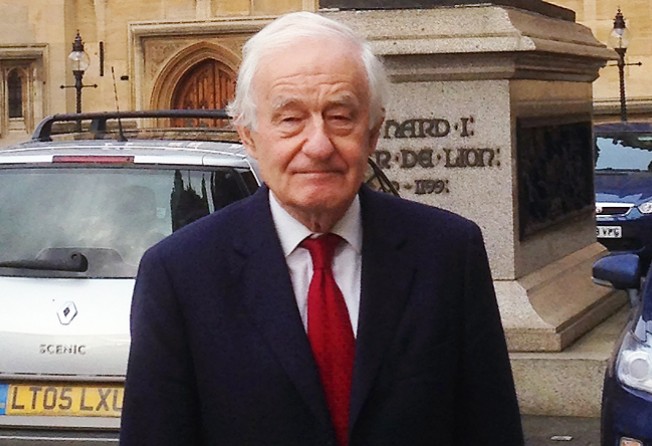Beijing gave in to London on elected Legco 'at last minute'

Beijing made a last-minute concession in 1984 to London's proposal that the Sino-British Joint Declaration would specify that the post-1997 Legislative Council should be elected, according to former Hong Kong governor David Wilson.
In an interview with the South China Morning Post in London, Wilson said the clause in the first annex of the 1984 joint declaration stating that "the legislature of the Hong Kong Special Administrative Region shall be constituted by elections" was only "put right in the last moment".
"It was one of the things we argued for, but China initially resisted it. That was the final concession on the Chinese side," he said.
The draft of the accord was signed on September 26, 1984. The formal agreement was signed by then premier Zhao Ziyang and British prime minister Margaret Thatcher in Beijing on December 19 that year.
Wilson, who was assistant undersecretary of state in Britain's Foreign and Commonwealth Office in 1984, was a member of the British team that negotiated the text of the agreement with Beijing.
Wilson, who served as governor from 1987 to 1992, is now a member of the House of Lords.
The former governor's recollection was in line with declassified British government records, which revealed then foreign secretary Geoffrey Howe proposed on September 6, 1984 that London should accept Beijing's position that the chief executive could be chosen by "election or consultation" in return for a statement in the joint declaration that the legislature should be elected.
According to a record of the meeting between Zhao and Thatcher in Beijing on December 19, 1984, Zhao said he was not prepared to make any comment on constitutional development during the transitional period.
But Zhao added that any measure to this end should not adversely affect the stability or prosperity of Hong Kong in the period up to 1997.
Wilson, 79, said that the Chinese side had agreed to the idea of forming Legco by election right at the last moment. "But Zhao would not have seen it as a big issue, when he just signed one of the most historic agreements China had ever signed. So he would not have wished to make a big issue out of it in conversation [with Thatcher]," said Wilson, who was present at the meeting between the two premiers.
But he noted that the signs of a Sino-British rift on Hong Kong's constitutional development in the transition period presaged the rows between the two sides in the run-up to 1997.
The colonial government introduced indirect elections to Legco for the first time in 1985. The "through train" arrangement, under which members of the last colonial legislature were to become members of the first legislature of the special administrative region, were derailed after Sino-British talks on electoral arrangements broke down in 1993.
"The underlying attitudes would have been: on the British side, to develop local institutions so as to get more and more representative government in Hong Kong and set that in place to the greatest extent during the remaining British administration. Also to do it in such a way as to continue beyond 1997," Wilson said.
"The Chinese point of view would have been to be a bit suspicious because they didn't want to sign a blank cheque. They had signed an agreement on the future of Hong Kong.
"If there were to be significant changes, they took the view - which is understandable - that those had to be agreed with them.
"And if these weren't agreed, then how could the British Hong Kong [government] expect them to continue beyond 1997. So you had a different approach the whole way to 1997."